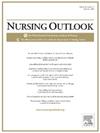Do nurse spiritual responses to trauma explain nurse outcomes? A correlational observational study
IF 4.1
2区 医学
Q1 NURSING
引用次数: 0
Abstract
Background
Various facets of spirituality are associated with well-being. Given the current urgency to promote nurse well-being, nurse spirituality merits exploration.
Purpose
To investigate how spiritual distress and growth (i.e., spiritual/religious struggle, moral injury, and post-traumatic growth) contributed to nurse outcomes (i.e., burnout, job satisfaction, and intent to leave).
Methods
Registered nurse (RNs) providing direct patient care in three Southern California hospitals completed an online survey that included psychometrically robust measures. Hierarchical multiple regression analyses were used to test spiritual variables as predictors of nurse outcomes after accounting for demographic and work-related factors.
Findings
In this sample of 531 demographically diverse RNs, spiritual struggle contributed to burnout and turnover intention; post-traumatic growth and employer respect for nurse well-being contributed to all three nurse outcomes.
Discussion
Spiritual distress and growth are understudied but potentially important influences on job outcomes for nurses. The results here suggest that continued development of interventions to address spiritual health is worth investment.
护士对创伤的精神反应能解释护士的工作结果吗?一项相关观察研究。
背景:精神的各个方面都与幸福感有关。目的:调查精神痛苦和成长(即精神/宗教斗争、道德伤害和创伤后成长)如何影响护士的工作结果(即职业倦怠、工作满意度和离职意向):方法:南加州三家医院中直接为患者提供护理服务的注册护士(RNs)完成了一项在线调查,调查内容包括心理测量。在考虑了人口统计学和工作相关因素后,使用层次多元回归分析来检验精神变量对护士工作结果的预测作用:在这个由 531 名不同人口统计学背景的护士组成的样本中,精神挣扎导致了职业倦怠和离职意向;创伤后成长和雇主对护士福祉的尊重导致了所有三种护士结果:讨论:精神痛苦和成长未得到充分研究,但可能对护士的工作结果产生重要影响。本文的研究结果表明,继续开发针对精神健康的干预措施是值得投资的。
本文章由计算机程序翻译,如有差异,请以英文原文为准。
求助全文
约1分钟内获得全文
求助全文
来源期刊

Nursing Outlook
医学-护理
CiteScore
6.20
自引率
7.00%
发文量
109
审稿时长
25 days
期刊介绍:
Nursing Outlook, a bimonthly journal, provides innovative ideas for nursing leaders through peer-reviewed articles and timely reports. Each issue examines current issues and trends in nursing practice, education, and research, offering progressive solutions to the challenges facing the profession. Nursing Outlook is the official journal of the American Academy of Nursing and the Council for the Advancement of Nursing Science and supports their mission to serve the public and the nursing profession by advancing health policy and practice through the generation, synthesis, and dissemination of nursing knowledge. The journal is included in MEDLINE, CINAHL and the Journal Citation Reports published by Clarivate Analytics.
 求助内容:
求助内容: 应助结果提醒方式:
应助结果提醒方式:


